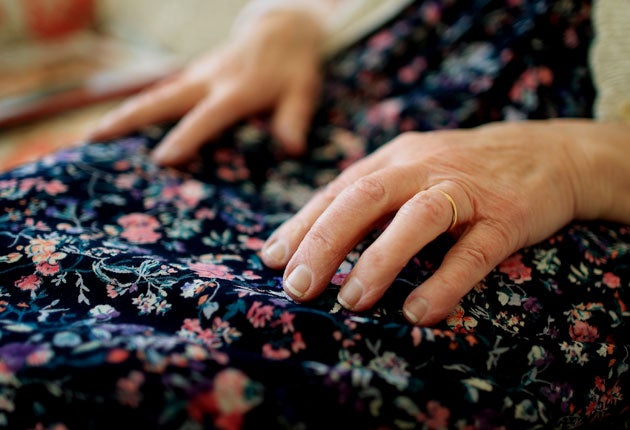Human rights of elderly 'overlooked' by home care

Your support helps us to tell the story
From reproductive rights to climate change to Big Tech, The Independent is on the ground when the story is developing. Whether it's investigating the financials of Elon Musk's pro-Trump PAC or producing our latest documentary, 'The A Word', which shines a light on the American women fighting for reproductive rights, we know how important it is to parse out the facts from the messaging.
At such a critical moment in US history, we need reporters on the ground. Your donation allows us to keep sending journalists to speak to both sides of the story.
The Independent is trusted by Americans across the entire political spectrum. And unlike many other quality news outlets, we choose not to lock Americans out of our reporting and analysis with paywalls. We believe quality journalism should be available to everyone, paid for by those who can afford it.
Your support makes all the difference.The basic human rights of older people being given care at home are being overlooked, with some left in bed for 17 hours between visits, according to a new report today.
The Equality and Human Rights Commission revealed it had found many "worrying" cases such as old people not being washed regularly or not being given proper help with eating food or drink.
The commission said a major inquiry it is conducting into home care in England, to be published in November, had identified a number of major problems.
Staff turnover in the sector was "huge", with one woman saying she had 32 different carers over a two week period.
The commission also found that elderly people were being left in soiled beds and clothing for long periods.
But it said there was a fear of complaining, because many did not know how to or believed there would be repercussions.
Home care visits were just 15 minutes in some cases, which did not allow basic essential tasks to be done properly, leaving people having to choose between having a cooked meal or a wash, said the report.
Staff had to rush tasks like washing and dressing leaving them feeling "frustrated and dissatisfied", while many older people had little or no control over the timing of visits.
Some people were put to bed at 5pm and were not helped to get up until 10am the following morning, a gap of 17 hours, the commission found.
Lack of privacy was also uncovered, with one old person complaining of being dressed by care staff in front of his bungalow window, and another in front of family members.
"The full extent of the potential human rights breaches is likely to be masked by the fear of complaining and the low expectations about the quality of home care that many older people believe they are entitled to.
"One in five older people who responded to the call for evidence said that they would not complain because they didn't know how to, or for fear of repercussions.
"In addition, we are exploring what protection and support is in place for whistleblowers who want to expose poor or abusive practices," said the report, drawn from over 500 submissions from individuals, organisations and home care staff.
Care Services Minister, Paul Burstow said: "There can be no place for poor quality care in care services, either in the home care system or in residential homes.
"The shocking abuses at Winterbourne have thrown into sharp focus how important it is that the dignity and safety of the most vulnerable people in our society are safeguarded.
"We welcome the Inquiry, which will help drive up standards of care and expose bad practice. We look forward to seeing the results."
Baroness Sally Greengross, an EHRC commissioner, said there had never been enough resources allocated to this type of care.
"The numbers of people requiring it are going up all the time, so we have to put in more resources and we have to adjust our resource allocation accordingly, part of this is medical success," she told BBC Breakfast.
"Some of the illnesses that used to kill us are now in a way chronic and people can live with them, so we have got an ageing population who can live much longer with these conditions that mean they are very vulnerable.
"We must get this right and human rights is a tool that can help us."
She added that 15 minutes was not enough time to give another aspect of human rights - that of contact with someone else.
"There aren't enough care workers, so they rush from one person to the next and 15 minutes is not enough time to give people another aspect of their human rights which is contact with someone else," she said.
"A lot of older people are just on their own for 24 hours in this country, so that a person coming in is so important as a contact, a friend, someone to talk to.
"If you are rushing because you have got 15 minutes you have to choose - 'do I give them a meal or do I wash them properly, do I make sure that they are happy, that they are content, that they have got someone they can talk to a little'?
"If you don't have time for that because you are so rushed then you cannot do your job properly."
Join our commenting forum
Join thought-provoking conversations, follow other Independent readers and see their replies
Comments